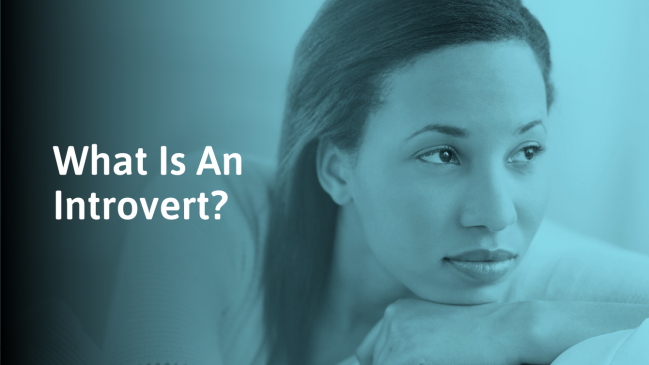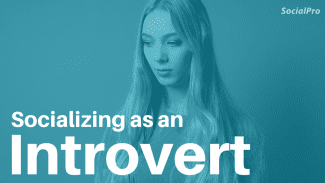Introversion and extroversion are personality traits that describe whether a person is more inclined towards social or solitary activities. Introverts are more likely to be reserved, quiet, and introspective. Extroverts are more outgoing and feel energized by socializing.[1][2][3]
Introverts are often misunderstood, especially in Western cultures that tend to idolize and reward extroverted personalities.[3][4] This can make it hard for introverted people to accept themselves and feel accepted and understood by others. Since introverts comprise about half of the population, it’s important to understand this personality type.[4][5]
This article provides a deep dive into the topic of introversion. It includes an overview of the signs of an introvert, different types of introverts, and how to know if you are an introvert.
Sections
- What is an introvert?
- Introverts vs. extroverts
- 10 signs you’re an introvert
- Causes of introversion
- 10 misconceptions about introverts
- Common questions
What is an introvert?
An introvert is someone who scores high on the trait of introversion. Introversion is a personality trait that describes a person who is more socially reserved, and reflective. They need time to recharge alone. Introverts can still be social people who enjoy spending time with others. However, too much social interaction can leave them feeling drained.[1][3]
It’s important to understand that there are different levels of introversion. Extreme introverts are highly reserved, quiet. They strongly prefer time alone. At the lower end of the spectrum are introverts who have some extroverted traits or are more social and outgoing.[5]
What are the 4 types of introverts?
Some experts believe there are 4 types of introverts:[1]
- Social introverts: Classic introverts who prefer quiet and low-key activities
- Thinking introverts: Introverts who spend time thinking, reflecting, or daydreaming
- Anxious introverts: Introverts who are shy, socially anxious, or awkward
- Inhibited introverts: Introverts who are cautious, restrained, and think before speaking
Introverts vs. extroverts
The main difference between introverts and extroverts isn’t how social or outgoing they are, but instead how they experience social activities and interactions. An extrovert tends to feel energized when socializing, while an introvert is more likely to feel drained by socializing (aka introvert burnout).[2][3]
Not all social interactions have the same effect, though. For example, many introverts enjoy 1:1 conversations or spending time with people closest to them but feel drained by larger social events.[3][5]
Many people wrongly assume that introverts and extroverts have opposite personalities. The reality is that both introversion and extroversion represent a spectrum. Most people fall somewhere in the middle. People who fall squarely in the middle are sometimes described as ambiverts who can’t be classified as either introverts or extroverts.[2][5]
Below is a chart breaking down some of the common differences between introverts and extroverts:[2][3][4]
| Introverted Traits | Extroverted Traits |
| Reflects and thinks before speaking/acting | Faster to speak up and act |
| Becomes drained or tired by social interaction | Energized by interacting with people |
| Prefers a small, close circle of friends | Prefers larger friend networks |
| More reserved, especially with strangers | More expressive, open, and outgoing |
| Focuses inward; spends more time introspecting | Focuses attention outward to other people |
| Prefers solitary, quiet activities or time alone | Prefers to be in the company of others |
| Shies away from the spotlight | Doesn’t mind being the center of attention |
10 signs you’re an introvert
If you’re wondering, “Am I an introvert?” there are a few different ways to find an answer. One is to take a personality test like the Big Five or the Myers-Briggs Type Indicator, which are assessments used to determine personality types. Even without taking a test, it’s usually possible to determine whether you are an introvert or an extrovert by tallying up the number of introverted traits you have.
(Note that the Myers-Briggs indicator is considered controversial. It’s best not to take the results too seriously; they are best used as a starting point to help you think about your personality.)
Below is a list of ten common signs, traits, qualities, and tendencies that introverts display.
1. You need to recharge after social activities
One of the main differences between introverts and extroverts is that introverted people feel drained after a lot of social interaction. Introverts need time alone to recharge their batteries, especially after a lot of social events. If a long weekend with friends and family leaves you craving some alone time, it might be a sign that you’re an introvert at heart.[1][3][5]
2. You prefer quiet, low-key activities
There’s a common stereotype that all introverts love reading or playing solitaire, but there’s also some truth to it. Activities that suit introverts are often quiet, chill, and low-risk. Many introverts are happy to sit out while their extroverted friends go bar-hopping or thrill-seeking. This is partially due to the introvert’s tendency to become overwhelmed more easily by their environment and also due to the introvert’s tendency to avoid taking risks.[2][3]
3. You cherish your alone time
Introverts not only need time alone to restore their energy—but they also tend to enjoy their alone time. Unlike people who are easily bored when they’re alone, most introverts have plenty of activities they like doing when they’re alone. Everyone needs social interaction to be healthy and happy (including introverts), but introverts tend to need a little less than extroverts. They often look forward to being alone, especially after a busy week full of social events.
4. You spend a lot of time thinking and reflecting
Spending a lot of time reflecting, thinking, or daydreaming is more common among introverts than extroverts. This is because extroverts tend to focus their attention outward, while introverts have the opposite tendency.[1][5] If you’re an introvert, you probably spend a good amount of time with your thoughts. Some introverts spend a lot of time introspecting and becoming more self-aware, while others are highly creative and have vivid imaginations.
5. You keep your social circle small (on purpose)
While an introvert may have a large network of acquaintances, they tend to prefer keeping a smaller, closer-knit circle of friends than extroverts. They may be friendly with lots of people while not counting many of those people as real friends. If your social circle is intentionally small and consists of people who are really close to you, it may be a sign that you’re more of an introverted person.[2]
6. You get overstimulated in loud and crowded places
Extroverts tend to feed off of the social energy of a crowd, but introverts often feel overwhelmed by places that are noisy or crowded. Some research suggests there is a neurological explanation for this that has to do with certain brain chemicals like dopamine, which extroverts need to get from their environment.[2][4] If big concerts, crowded dive bars, or a bunch of wild kids running around makes you want to crawl under a rock and hide, you might be an introvert.
7. You avoid being the center of attention
Not all introverts are socially anxious or shy, but most prefer not to be the center of attention.[2][4] If you’re an introvert, you might pray your boss doesn’t call you out in a meeting, even if it’s to praise you. You also might dislike public speaking, surprise parties, or cringe at the idea of having to perform in front of a group.
8. It takes effort to be a people person
People who have a more introverted personality may have to work a little harder than extroverts to be a people person.[2] This doesn’t always mean that introverts have poor social skills or don’t know how to communicate. However, using these social skills sometimes takes more effort. For example, having to network at a conference and make small talk with lots of people can be difficult and draining for an introvert.
9. It takes time for you to open up to someone
If you’re an introvert, you might find it hard to open up to people you’ve just met. Introverts tend to need a little more time to relax and feel comfortable around people than extroverts do. That’s why being a little reserved, private, or slow to warm up to people is another sign of introversion. Exactly how long it takes to feel comfortable varies, but introverts usually don’t feel comfortable telling their life story to someone they just met.
10. You often feel misunderstood
Being an introvert in a society that really values and rewards extroverts isn’t easy, which is why a lot of introverts feel misunderstood a lot.[3][4] For example, it’s common for introverted people to have people ask, “Why are you so quiet?” Some introverts are even wrongly labeled as antisocial.
Causes of introversion
The signs that you are an introvert usually show up in early childhood, suggesting that introversion (like other personality traits) is partially caused by genetics. Some researchers have found differences in the brain chemistries of introverts and extroverts that may cause introverts to need less social and environmental stimulation.[2]
A person’s environment and early childhood experiences also factor in and help determine how introverted or extroverted they are.[1] For example, a shy kid who is pushed into sports, performing arts, or social clubs will probably end up more extroverted than a shy kid who spends most of their time at home alone.
10 misconceptions about introverts
Misconceptions about introverts are common. People with this personality type tend to be quieter and more reserved than average, which makes it even harder for others to understand them. Many introverted qualities and traits are also portrayed negatively by society, which only worsens the misconceptions about introverts.[3][4]
Below are 10 common misconceptions about introverts.
1. You’re either an introvert or an extrovert
Introversion and extroversion aren’t opposites. They represent two sides of a spectrum, and most people fall somewhere in the middle. People who fall closer to the introversion side are classified as introverts, and those on the other side are classified as extroverts. People in the middle are sometimes referred to as ambiverts. Ambiverts have roughly equal introverted and extroverted traits.[1][2][5]
2. Introverts are always shy
Being introverted is not the same as being shy. A person who is shy avoids certain social interactions because of anxiety, while an introvert simply prefers less social interaction. Both introverts and extroverts sometimes feel shy, but being a shy person doesn’t make someone introverted or extroverted.
3. Introverts don’t get lonely
Introverts are sometimes portrayed as loners who don’t want or need to be around people, but this isn’t true. All humans need social interactions to be healthy, happy, and successful. Introverts may need slightly less social interaction than extroverts, but they will still feel lonely and isolated without enough social contact.
4. Introverts have poor social skills
Some people believe introverts don’t talk to people as much because they’re socially inept or lacking in social skills, but this isn’t necessarily true. Social skills are first developed early on in life and can be continuously improved with effort and practice. While some aspects of socializing can be draining for introverts, having this kind of personality doesn’t put them at a disadvantage.
5. Only introverts struggle with social anxiety
Social anxiety disorder is a common mental health issue. It is a treatable disorder with symptoms that can be managed with treatments like therapy. Both introverts and extroverts can struggle with social anxiety, and being introverted doesn’t automatically mean someone has the disorder.
6. Introverts can’t form close relationships
Another myth about introverts is that they can’t form healthy or close relationships or that their relationships aren’t as fulfilling as extroverts’ relationships. This isn’t the case. In fact, some introverts may have even closer and more fulfilling relationships than extroverts. For example, having a smaller, closer circle can make it easier for introverts to prioritize the people that matter most to them.[2][3]
7. Introverts are less successful than extroverts
While it is true that there is a negative stigma against introverts, being introverted doesn’t make someone less likely to succeed in their job or their life. Some introverts shy away from leadership roles or high-profile positions, but many learn how to adapt and thrive in these roles.[3][4] Even those who do avoid these roles can find alternative pathways to success that suit their personality type.
8. Introverts don’t like people
Another unfortunate myth about introverts is that they avoid social interactions because they don’t like people or don’t enjoy the company of others. It’s more accurate to say that introverts have different styles of socializing. For example, they often prefer small groups to large crowds and prefer having deep, 1:1 conversations instead of making small talk or talking in groups.[3][4]
9. Introverts and extroverts don’t get along
It’s also untrue that introverts and extroverts can’t form close relationships. Like most relationships, being different isn’t an issue unless people aren’t able to understand and respect each other’s differences. Introverts and extroverts can become great friends and may even help to balance each other out.
10. Introverts can’t be extroverted
A final misconception about introverts is that they’re unable to adapt and become more extroverted. The truth is that many introverts become more extroverted over time, especially when their lives and circumstances push them to adapt and become more social and outgoing. Sometimes, introverts become more extroverted after making a conscious effort to change.
Final thoughts
Being introverted isn’t a character flaw or weakness, and it also doesn’t mean you have bad social or communication skills. If you are more introverted, it just means that you need to balance your social life with your self-care. Most introverts need to incorporate alone time into their self-care routine, which helps them rest and recharge.
Common questions
What are introverts good at?
Introverts can have many personal strengths and talents. Some experts believe introverts are more thoughtful, self-aware, and able to work independently than extroverts. Introverts may also have closer, more meaningful relationships with people.[2][3][4]
Are introverts happy in life?
Some research suggests extroversion is linked to happiness, but this doesn’t mean that introverts are destined to be unhappy in life. In fact, a person’s personal choices and the way they choose to spend their time have a much greater impact on happiness than their personality type.[6]
What does an introvert need in a relationship?
If you’re an extrovert in a relationship with an introvert, remember they may need more space or alone time than you do. Try not to take it personally when they want to be alone or aren’t up for every single party or game night on your social calendar.





